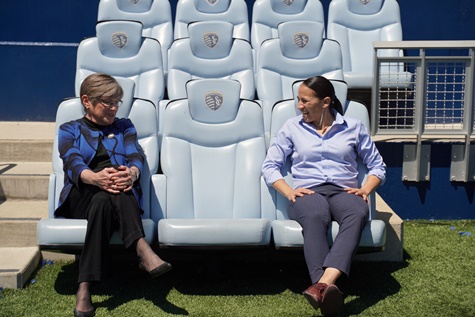GOP nominee for governor says mandate may let children fall through cracks
by Tim Carpenter, Kansas Reflector
Topeka — Republican governor candidate Derek Schmidt toured a Wichita high school degree completion program to place emphasis on ramifications of Gov. Laura Kelly’s decision in March 2020 to close Kansas public school buildings in response to the COVID-19 pandemic.
Schmidt, who also met with parents Monday during the campaign swing, said it was “damaging” for the Democratic governor to have become the nation’s first chief executive to shift instruction to an online format in early stages of a pandemic. COVID-19 has contributed to the death of 8,958 Kansans.
“It was an unnecessarily overaggressive approach,” Schmidt said. “In hindsight, it was not justified at the time and yet here we are all this time later trying to figure out how to remedy the damage.”
Schmidt said enrollment in Kansas public schools was down about 14,000 students more than two years after COVID-19 swept the nation. He raised concern some of those students slipped through cracks in the education system. He said a portion were unaccounted for, but offered no insight into how private schools, homeschooling or movement to other states might explain absence of students from public schools.
Kansas public schools have returned to normal operations under direction of the Kansas Board of Education. The state Department of Education reported 518,800 students attended public schools in Kansas during 2019-2020. That dropped to 502,400 in 2020-2021, due to the pandemic. In 2021-2022, enrollment was 12,400 below the pre-pandemic level. The 2022-2023 enrollment reports have yet to be compiled by the state.
“As governor,” Schmidt said, “I pledge I will never again lock our children out of their schools, and I hope that Governor Kelly will take that same pledge. I think our families and our kids deserve to know they don’t need to worry about a repeat of this terrible error.”
‘World-class education’
Kelly was elected governor in 2018 based in part on her advocacy for K-12 public education, including the effort to restore full state funding of school districts.
During her term, the Legislature and Kelly increased the state’s financial investment in education to comply with constitutional requirements affirmed through protracted litigation. Supporters of Kelly’s reelection have expressed fear a Republican governor could jeopardize financial gains by public schools.
“I ran for governor in 2018 because I knew that properly funding our schools was the first step to ensuring our kids receive the world-class education they deserve,” Kelly said.
Kelly issued an executive order March 17, 2020, that recognized the public health emergency of COVID-19. That followed by several days President Donald Trump’s declaration the pandemic was of “sufficient severity and magnitude to warrant” emergency action by all states, tribes, territories and the District of Columbia.
“Kansas’ K-12 schools are the backbone of our communities,” Kelly said at that time. “But they are also opportunities to significantly further the spread of COVID-19. Many schools have already temporarily closed, either voluntarily or as a result of local health departent orders or state-level recommendations.”
She said her executive order outlined a statewide approach offering students, parents, teachers, staff and administrators greater certainty and opportunity for the state and districts to implement alternative instructional programs that didn’t center on in-person teaching.
During the pandemic, Kelly and state lawmakers allocated $15 million for “remote learning” grants used to address needs of students not able to be part of in-person instruction. The state also approved $50 million for “learning recovery” grants, which supplemented other aid to students.
Kelly said during the campaign that Kansas’ world-class education system was part of what has propelled the state’s growing economy.
“I’m looking forward to continuing to uplift Kansas’ public education with the support of our world-class educators,” she said.
Wichita perspectives
In Wichita, Schmidt said he appreciated work of the Acceleration Academy, which formed a partnership with Wichita public schools to provide one-on-one instruction to individuals 14 to 21 years of age who wanted to earn a high school diploma.
Schmidt, the state’s attorney general, also repeated a claim Kelly was to some degree responsible for rising mental health issues of Kansas youth and the exit of Kansas educators from the profession. Both are national trends.
Patty Bledsoe, a family practice physician in Wichita, said during a meeting with Schmidt the closure of school buildings and the disruption of classroom instruction had a negative impact on some students.
“I have seen in my patient population significant increase in anxiety and depression in very, very young students that I don’t think we’ll see the end results on for years to come,” Bledsoe said. “So, are we back to normal? We’re back to what appears to be normal. But I think it’s going to be 10 years before we see the truth of what happened.”
Natalie Ellis, who also spoke to Schmidt about repercussions of the governor’s response to COVID-19, said movement away from regular school classes was detrimental academically, socially and emotionally to students.
“As parents we spoke out for two years about the issues at hand in our school district, but no one listened,” she said. “The data is now proving that lockdowns did way more harm than good. Tests scores are down. Proficiency levels have tanked. And anxiety and depression are through the roof. Kansans need a governor who will listen to and protect parental rights. That’s why I’m voting for Derek Schmidt.”
Kansas Reflector stories, www.kansasreflector.com, may be republished online or in print under Creative Commons license CC BY-NC-ND 4.0.

